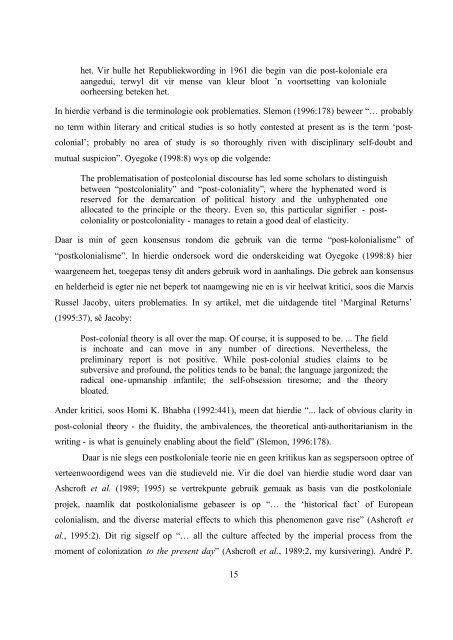POTGIETER-MA-TR02-81.pdf
POTGIETER-MA-TR02-81.pdf
POTGIETER-MA-TR02-81.pdf
You also want an ePaper? Increase the reach of your titles
YUMPU automatically turns print PDFs into web optimized ePapers that Google loves.
het. Vir hulle het Republiekwording in 1961 die begin van die post-koloniale era<br />
aangedui, terwyl dit vir mense van kleur bloot ’n voortsetting van koloniale<br />
oorheersing beteken het.<br />
In hierdie verband is die terminologie ook problematies. Slemon (1996:178) beweer “… probably<br />
no term within literary and critical studies is so hotly contested at present as is the term ‘post-<br />
colonial’; probably no area of study is so thoroughly riven with disciplinary self-doubt and<br />
mutual suspicion”. Oyegoke (1998:8) wys op die volgende:<br />
The problematisation of postcolonial discourse has led some scholars to distinguish<br />
between “postcoloniality” and “post-coloniality”, where the hyphenated word is<br />
reserved for the demarcation of political history and the unhyphenated one<br />
allocated to the principle or the theory. Even so, this particular signifier - postcoloniality<br />
or postcoloniality - manages to retain a good deal of elasticity.<br />
Daar is min of geen konsensus rondom die gebruik van die terme “post-kolonialisme” of<br />
“postkolonialisme”. In hierdie ondersoek word die onderskeiding wat Oyegoke (1998:8) hier<br />
waargeneem het, toegepas tensy dit anders gebruik word in aanhalings. Die gebrek aan konsensus<br />
en helderheid is egter nie net beperk tot naamgewing nie en is vir heelwat kritici, soos die Marxis<br />
Russel Jacoby, uiters problematies. In sy artikel, met die uitdagende titel ‘Marginal Returns’<br />
(1995:37), sê Jacoby:<br />
Post-colonial theory is all over the map. Of course, it is supposed to be. ... The field<br />
is inchoate and can move in any number of directions. Nevertheless, the<br />
preliminary report is not positive. While post-colonial studies claims to be<br />
subversive and profound, the politics tends to be banal; the language jargonized; the<br />
radical one-upmanship infantile; the self-obsession tiresome; and the theory<br />
bloated.<br />
Ander kritici, soos Homi K. Bhabha (1992:441), meen dat hierdie “... lack of obvious clarity in<br />
post-colonial theory - the fluidity, the ambivalences, the theoretical anti-authoritarianism in the<br />
writing - is what is genuinely enabling about the field” (Slemon, 1996:178).<br />
Daar is nie slegs een postkoloniale teorie nie en geen kritikus kan as segspersoon optree of<br />
verteenwoordigend wees van die studieveld nie. Vir die doel van hierdie studie word daar van<br />
Ashcroft et al. (1989; 1995) se vertrekpunte gebruik gemaak as basis van die postkoloniale<br />
projek, naamlik dat postkolonialisme gebaseer is op “… the ‘historical fact’ of European<br />
colonialism, and the diverse material effects to which this phenomenon gave rise” (Ashcroft et<br />
al., 1995:2). Dit rig sigself op “… all the culture affected by the imperial process from the<br />
moment of colonization to the present day” (Ashcroft et al., 1989:2, my kursivering). André P.<br />
15

















